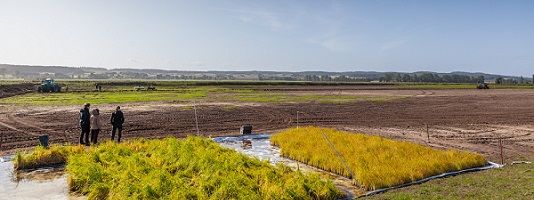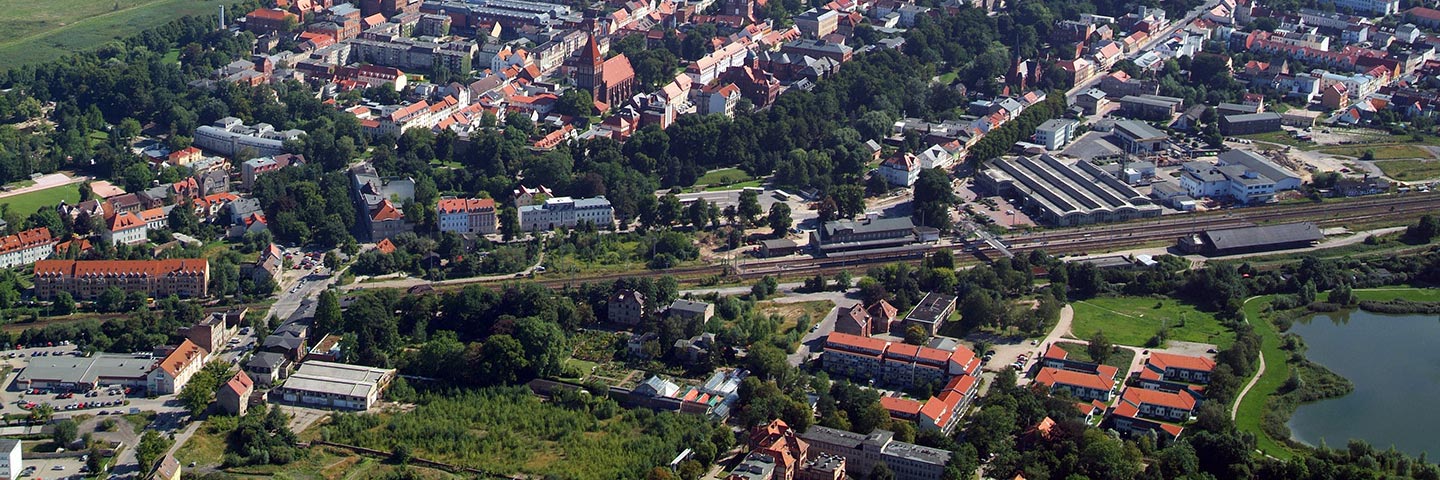News/All pieces
Lithuania: EU frontrunner in peatland recovery
16 million Euro reserved for restoring 8000 ha
20/05/2021 Amazing news from Lithuania: The investment for 16 mln. Euro has been earmarked in the Lithuanian EU Recovery and Resilience Facility plan for restoration of 8000 ha of currently drained agricultural peatlands. It was submitted to the European Commission on 17th May. The measure aims to reduce greenhouse gas emissions from agriculturally used peatlands by reversing negative impacts of drainage until 2026 and paving the road for further upscaling. So far, restoration projects were concentrating on rewetting protected raised bogs. Now, Lithuania is targeting agriculturally utilized fens which afford intensive cooperation of institutions, NGOs and land users but hold a huge potential as nature-based solution for climate action, especially in a peatland rich country like Lithuania. This is also an affirming result of the successful cooperation of the Lithuanian Foundation for Peatlands restoration and Conservation (FPRC) and the Succow Foundation, partner in the Greifswald Mire Centre. Around Baisogala, the organisations are rewetting agricultural land for carbon credits and could induce their experiences into the now accepted “New Generations’ Lithuania”-plan. For restoring peatlands in the Baltics, the Succow Foundation is also engaged in the EU-funded projects DESIRE and LifeOrgBalt.
The EU Recovery and Resilience Facility will make €672.5 billion in loans and grants available to support reforms and investments undertaken by Member States. The aim is to mitigate the economic and social impact of the Covid19 pandemic and make European economies and societies more sustainable, resilient and better prepared for the challenges and opportunities of the green and digital transitions.
Peatlands in EU Biodiv Strategy
GMC position paper gives recommendations
28/04/2021 Healthy peatlands can contribute as nature-based solutions to the achievement of the European Green Deal and to the EU Biodiversity Strategy 2030. Hence, they need to be sufficiently protected and restored. How to do this is described in the GMC’s position paper Protecting and Restoring Peatlands – Targets and Recommendations for Peatlands in the EU Biodiversity Strategy. It lists the co-benefits of restoration, a qualitative as well as a quantative approach and principles to be included in the legislative proposal.
As claimed by the European Commission the biodiversity strategy will put Europe on the path to ecological recovery by 2030. The strategy, which is not a legislative proposal, has been adopted already by the European Council and still needs to be endorsed by the European Parliament. Votes are foreseen for May and June 2021.
RRR2021 conference now documented
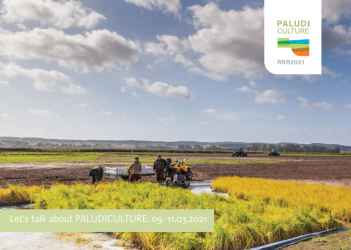
Key messages, presentations and virtual excursions online
23/04/2021 From 9th-11th March 2021 the partners in the Greifswald Mire Centre organised the virtual 3rd conference on Renewable Resources from Wet and Rewetted Peatlands - RRR2021. More than 300 scientists and practitioners from 25 countries around the world shared their knowledge about paludiculture. Now, the key messages of the conference, the more than 100 presentations and posters are documented and available online.
You may find videos from two passionate keynotes and the special session on “Finance options for livelihoods from wet peatlands” co-organised with FAO, UNEP, IUCN and WWF on the YouTube channel of the Greifswald Mire Centre. Also some other highlights are to be revisited: The RRR2021 virtual excursions take you to bogs and fens, to rewetted peatlands, pilot sites for Sphagnum or Typha cultivation, a heating plant and a Paludiculture Tiny house. You also may enjoy some breathtaking peatland pictures presented by Tina Cliffey in her photography workshop. Concise information on the entire conference are given in the RRR2021 proceedings.
Do you know Betje Polak?
Meet the queen of tropical peatlands at PeNCIL
04/02/2021 Peatland expert and bibliophile Prof. Hans Joosten regularly present stories and facts around peatlands at public literature evenings in the Greifswald Peatland and Nature Conservation International Library (PeNCIL). For the conference RRR2021 Renewable resources from wet and rewetted peatlands he opens the doors of the library to the participants and invite you to listen about a strong woman, who laid the foundations of peatland research in the tropics under the most difficult conditions: Betje Polak - Queen of tropic peatlands. Participation is free but registration is required per e-mail to bibliothek[at]greifswaldmoor.de. All persons registered will be sent a zoom-link to log in.
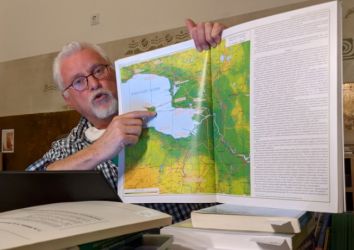
What actually is paludiculture?
New GMC position paper provides definition for the CAP
04/02/2021 It just takes a sentence: “Paludiculture is the productive land use of wet and rewetted peatlands that preserves the peat soil and thereby minimizes CO2 emissions and subsidence.” The Greifswald Mire Centre and partners recommend this definition in a new briefing paper. Since paludiculture has been proposed as an “agricultural activity” in the amendments to the EU’s Common Agricultural Policy (CAP) legislative text, which is currently under negotation in the trilogue, a clear understanding of the term is now very important. In addition the GMC provides a list of Paludicultural plants and utilisation options (selection), which includes plant species already used in paludiculture and plant species with a promising paludiculture potential.
Results of the WETSCAPES research project
New comprehensive understanding of rewetted fens
04/02/2021 Research results from the four-year WETSCAPES project of the Universities of Rostock and Greifswald were presented by the participating scientists on February 24th - online, of course. Among other things, they found that studied rewetted peatlands are partly net CO2 sinks, emissions of methane play a smaller role than previously assumed, and peatlands may function as sink for nitrous oxide. Looking into the ground and the past showed that root growth in fens can be up to ten times higher than on mineral soils, and that drainage has lowered ecosystem services in fen-rich areas of northern Germany, some of them irreversibly. As part of Mecklenburg-Vorpommern's excellence research programme, the WETSCAPES project has pooled the local but internationally significant expertise in peatland research and provided a scientific basis for state policy makers and land owners. They can now decide even more reliably and consistently in favour of rewetting as a central climate protection measure of the state.
What a wet future might look like
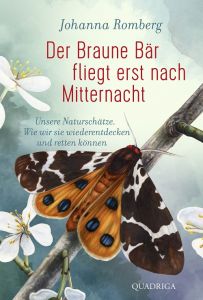
New book describes a time after the "great rewetting"
04/02/2021 The agricultural and transport turnarounds are already history and the state agency for peatland research and revitalization, based in Greifswald, has been successfully established. There are no more subsidies for drained peat soils, but "snipe bonuses" for farmers – that's what a wet future could look like. In her new book "Der Braune Bär fliegt erst nach Mitternacht"( The brown bear flies only after midnight) the author Johanna Romberg describes our natural treasures and how we can rediscover and revive them. Romberg also describes the role the Greifswald Mire Centre plays in her scenarios. This chapter can also be read as an article on RiffReporter entitled "Die Rückkehr der Unken" ("The return of the toads": How new peatlands take carbon dioxide out of the air and help rare species).
„Wetlands and Water“ – World Wetlands Day 2021
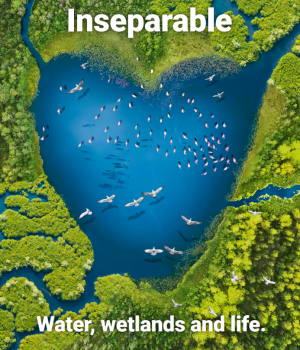
GMC showcases peatlands as buffers and filters
02/02/2021 With the slogan “Wetlands and water” this year’s World Wetlands Day (WWD), Tuesday, February 2nd, draws attention to peatlands and their importance for the earth’s freshwater resources. The Greifswald Mire Centre (GMC) offers a new fact sheet (GMC factsheet Wetland Buffer Zones, greifswaldmoor.de) on peatlands as buffer zones that retain nutrients from agriculture and filter water and thus secure a livelihood for people and nature.
World Wetlands Day (WWD) has long been highlighting the situation of peatlands and other wetlands. It has been celebrated annually on February 2nd since 1997, when the Ramsar Convention, the international agreement for the protection of wetlands, was adopted in 1971. Sadly, 35% of the wetlands have been further destroyed by pollution, agriculture and overfishing since then, although they offer ecosystem services that are indispensable for humans: Peatlands filter and store water, also cool the landscape and offer a buffer in the event of flooding. They store carbon in their peat - twice as much as all the biomass of the World’s forests. And they offer space for recreation and even new income opportunities. Biomass from wet peatlands can be used as construction, fodder and heating material or as a substitute for fossil peat in horticulture.
2 foundations + 1 cooperation = a plus for peatland and climate
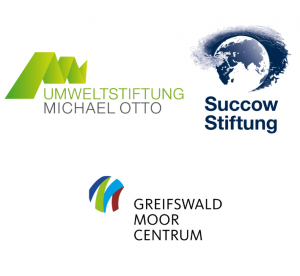
Environmental Foundation Michael Otto and GMC cooperating
02/02/2021 The rewetting of peatlands offers a potential for ecosystem-based climate protection as well as for adaptation, which is above-average but so far barely used. Given the climate crisis, it is urgent to use this potential and to set ambitious goals as this: By 2050 almost all drained peatlands must be rewetted - an Herculean task! A transformation pathway must set ambitious interim goals and offer perspectives for involving a large number of partners.
Luckily, social awareness for peatlands is growing right now. Federal and regional politics include measures for peatland rewetting in climate protection plans. Also, NGOs and companies are paying more attention to them. Therefore it is crucial to establish new and strong alliances that support peatlands as a nature-based solution for climate protection and as spaces for bioeconomy and green growth. A close link between science and practice must be guaranteed.
The Environmental Foundation Michael Otto and the Succow Foundation, partner in the Greifswald Mire Centre, will therefore begin a long-term cooperation on peatland climate protection in 2021. Their extensive networks, experience and competencies are strategically brought together. The project pursues three goals: 1. The practical demonstration of the potential of peatland protection for the protection of climate and biodiversity. 2. Activation of commercial enterprises for the sustainable use of wet peatlands through added value from paludiculture and through carbon credits. 3. The advocacy of improved framework conditions for peatland protection in the climate and agricultural policy of the federal government, the federal states and the EU. We look forward to keeping you informed about the project’s progress.
Titel: RRR2021 – registration + programme now online
100 presentations, passionate keynotes and arty side events
02/02/2021 The registration for the virtual conference "Renewable Resources from Wet and Rewetted Peatlands - RRR2021" 9th - 11th March 2021 is now open and the preliminary programme online. RRR2121 will share and widen knowledge about paludiculture worldwide. There will be passionate keynote speakers and more than 100 scientific oral and poster presentations in 21 parallel sessions. The session on “Finance options for livelihoods from wet peatlands” is co-organised with FAO, UNEP, IUCN, and WWF. To make up for excursions - usually one of the most enjoyable parts of conferences – the RRR2021 takes you on four inspiring virtual paludiculture tours. A literature evening, workshops, and an art session are further highlights. Wetland-related products, techniques, and services can be seen and visited in the virtual exhibition hall. With discussion forums, open spaces, and face to face conversations the virtual platform provides best networking opportunities with scientists and practitioners from all over the world. The RRR2021 conference is co-organised by the partners in the Greifswald Mire Centre.
